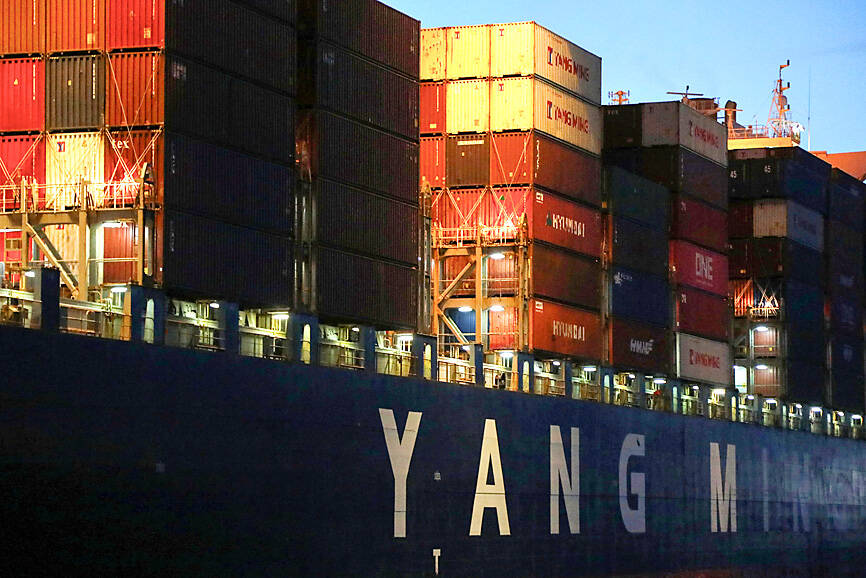The global container shipping industry still faces uncertainties ahead due to ongoing global inflationary pressures and geopolitical risks, Yang Ming Marine Transport Corp (陽明海運) said yesterday, as it announced a cash dividend of NT$20 per share this year, unchanged from last year.
“Since the fourth quarter of last year, consumers’ purchasing power has been diminished by the effects of inflation and high inventory levels,” which has slowed overall economic activity and caused headwinds for the shipping industry, Yang Ming said in a statement.
Yang Ming, Taiwan’s second-largest container shipper by fleet size, said that supply-demand imbalances also continue to weigh on the outlook for freight rates.

Photo: Ann Wang, REUTERS
“According to [maritime consultant] Alphaliner’s latest forecast, an oversupply in the container shipping market is expected in 2023, with an 8.2 percent growth in capacity and a 1.4 percent growth in throughput,” Yang Ming said.
On a positive note, there is a potential for improvement in economic activity, the shipper said, citing a forecast by the IMF in January of 2.9 percent growth for the global economy this year, up from its previous prediction of 2.7 percent growth.
“As China lifts [COVID-19] restrictions and the gradual reduction of inventory, it might stimulate overall economic activity. These factors are likely to create a relatively positive environment for the shipping industry in the second half of the year,” Yang Ming said.
With the International Maritime Organization’s Carbon Intensity Indicator taking effect this year, container shippers are expected to implement slow steaming, retrofit ships and retire older vessel to reduce carbon emissions, which could help balance the supply-demand dynamics, it said.
Yang Ming’s board of directors yesterday approved the company’s plan to distribute a cash dividend of NT$20 per share this year after the company posted consolidated revenue of NT$375.93 billion (US$12.2 billion) last year, setting a new record, with net profit of NT$180.6 billion, or earnings per share (EPS) of NT$51.71.
Revenue increased 12.39 percent from NT$334.48 billion in 2021, and net profit rose 9.28 percent from NT$165.27 billion the previous year, when EPS were NT$48.73.
The proposed dividend represents a payout ratio of 38.68 percent and a dividend yield of 29.85 percent after the company’s shares closed at NT$67 yesterday.
To sustain its profitability amid ongoing external uncertainties, Yang Ming said it aims to explore new business opportunities, optimize its cargo structure, enhance its space utilization and prioritize customer satisfaction.

RECYCLE: Taiwan would aid manufacturers in refining rare earths from discarded appliances, which would fit the nation’s circular economy goals, minister Kung said Taiwan would work with the US and Japan on a proposed cooperation initiative in response to Beijing’s newly announced rare earth export curbs, Minister of Economic Affairs Kung Ming-hsin (龔明鑫) said yesterday. China last week announced new restrictions requiring companies to obtain export licenses if their products contain more than 0.1 percent of Chinese-origin rare earths by value. US Secretary of the Treasury Scott Bessent on Wednesday responded by saying that Beijing was “unreliable” in its rare earths exports, adding that the US would “neither be commanded, nor controlled” by China, several media outlets reported. Japanese Minister of Finance Katsunobu Kato yesterday also

China Airlines Ltd (CAL, 中華航空) said it expects peak season effects in the fourth quarter to continue to boost demand for passenger flights and cargo services, after reporting its second-highest-ever September sales on Monday. The carrier said it posted NT$15.88 billion (US$517 million) in consolidated sales last month, trailing only September last year’s NT$16.01 billion. Last month, CAL generated NT$8.77 billion from its passenger flights and NT$5.37 billion from cargo services, it said. In the first nine months of this year, the carrier posted NT$154.93 billion in cumulative sales, up 2.62 percent from a year earlier, marking the second-highest level for the January-September

‘DRAMATIC AND POSITIVE’: AI growth would be better than it previously forecast and would stay robust even if the Chinese market became inaccessible for customers, it said Taiwan Semiconductor Manufacturing Co (TSMC, 台積電) yesterday raised its full-year revenue growth outlook after posting record profit for last quarter, despite growing market concern about an artificial intelligence (AI) bubble. The company said it expects revenue to expand about 35 percent year-on-year, driven mainly by faster-than-expected demand for leading-edge chips for AI applications. The world’s biggest contract chipmaker in July projected that revenue this year would expand about 30 percent in US dollar terms. The company also slightly hiked its capital expenditure for this year to US$40 billion to US$42 billion, compared with US$38 billion to US$42 billion it set previously. “AI demand actually

Jensen Huang (黃仁勳), founder and CEO of US-based artificial intelligence chip designer Nvidia Corp and Taiwan Semiconductor Manufacturing Co (TSMC, 台積電) on Friday celebrated the first Nvidia Blackwell wafer produced on US soil. Huang visited TSMC’s advanced wafer fab in the US state of Arizona and joined the Taiwanese chipmaker’s executives to witness the efforts to “build the infrastructure that powers the world’s AI factories, right here in America,” Nvidia said in a statement. At the event, Huang joined Y.L. Wang (王英郎), vice president of operations at TSMC, in signing their names on the Blackwell wafer to